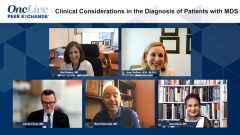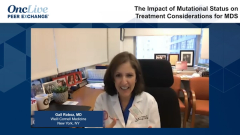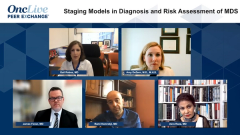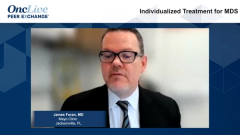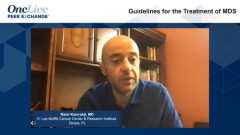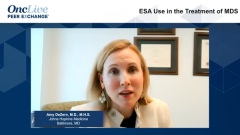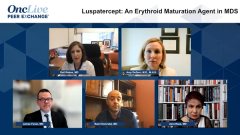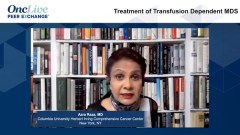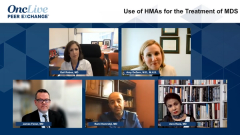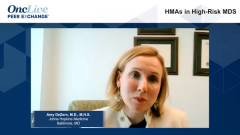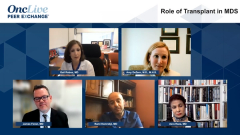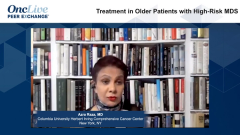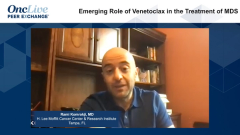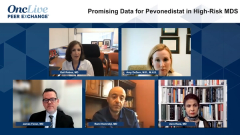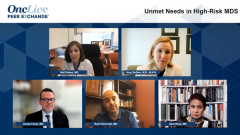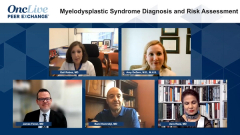
Unmet Needs in High-Risk MDS
The panel of experts highlight promising clinical trials for the treatment of myelodysplastic syndrome.
Episodes in this series

Gail Roboz, MD: I lived this cautionary tale in the way that I knew that I would end, which is obviously from Azra's long perspective on being careful not to jump too early. That said, I would say that we would all be very excited to actually have confirmation of some of those benefits, and the good news is that we are talking about big Phase 3 trials, so there is a lot of excitement about the possibility of showing something real. But Rami is jumping out of his chair, so tell me.
Rami Komrokji, MD: I have to say, this is a story, but I have to comment. I get this call from Azra. I take it seriously when I get a call from her. I'm in clinic, so I answer. She's like, "How would you accept a complete response as an endpoint for a Phase 3 trial? How did you– I saw you on the steering committee. Why would you do that?" And I was like, "OK”. She's like, "You should never do a Phase 3 with a CR endpoint." But I think what I wanted to bring is particularly with the pevonedistat, that for the first time we saw an event-free survival data looking not just overall survival, but AML transformation. I would like to know what people think of it because I'm curious. We never had looked at the event-free survival as an endpoint in MDS studies. But the other thing with pevonedistat also that was appealing to me, and I don't know what James' experience is, the durability of the response, that once patients responded the average duration was 30 months plus. But I'm curious about people comment about event-free survival for clinical trials in MDS.
Gail Roboz, MD: Yeah, I have to say, event-free survival, we were pretty happy to get that in AML because it did seem to be the case that in general it's better to hang out in remission, it just plain is in AML, and if you have the event of relapse, that was an important moment to look at. I don't even know what it means exactly in MDS, though, because what's the event? And are you transfusing the patient? Are they getting growth factor? How do you identify exactly what's happening in a, quote unquote, progressing, or relapsing MDS patient? I think it's harder. And James looks like he's wanting to respond to that.
James Foran, MD: Well, I'm gonna agree with Dr. Raza really in the end, because I almost always do. In fact, I think I always have. But event-free survival in this case, it's a phenomenon of the clinical trial and they're looking at people who don't get leukemia and don't die, and those are both important endpoints in MDS. I'm pretty sure, and really to be meaningful, it's gonna have to track with overall survival to really change our practice and it's gonna have to be a non-trivial improvement if there is an improvement. You're right, there are quirks of trial designs and complete remission-based and event-free survival or overall survival, and sometimes those are just avenues for drug development. Let's face it, that's just sort of where you see your signal. But it has to be clinically meaningful for us to adopt it. I guess I'll just leave it at that.
Gail Roboz, MD: We're going to start wrapping up the panel discussion because we're going to run into time problems, but I want to– So I think it's a happy place to end that discussion, though, to say that we're actually having this discussion. There are Phase 3 trials about to read out in MDS that did accrue, we will have some survival data to look at, there are some mutational subgroups to look at, and I think that that's great because we really, really need it. I want to end on what I hope is a very positive note that I think that having the availability of oral hypomethylating agents to combine with whatever we find as good partners, we want to be able to try to keep people out of the office, and there are some promising– Oral therapy can be difficult, but it can also be promising. And I just want to get your thoughts, so we have, for example, the oral decitabine, which is combined with cedazuridine so that it doesn't get completely broken down, is the same really pharmacokinetically and from a response perspective, it looks like it's the same as decitabine. You can give it to somebody to take at home for five days or three days instead of giving it in the clinic. I just want to get sort of each of your thoughts, given that where MDS is going and given that we're sort of, we have decitabine available in what is viewed as an equivalent version, oral azacytidine is not the same as injectable azacytidine, these are different agents, but there is development underway to try to understand what can be done in MDS. Can somebody envision that MDS will become much more outpatient and out of the office oriented, or is the disease just going to prevent that from happening because these patients need too much support no matter how the therapy is actually delivered? And I'm going to give each of you sort of 10 seconds to close out with a comment on that. I'll start with Amy.
Amy DeZern, M.D., M.H.S.: I think it's certainly a goal to decrease healthcare interactions. I'm honest, though, that I think these are patients that need a watchful eye, and so it's never going to truly eliminate the doctor/patient relationship or probably count checks and transfusions. But I'm hopeful it'll be less visits.
Gail Roboz, MD: Rami?
Rami Komrokji, MD: Yeah, I totally agree. I think, I just want to say a cautionary thing, I think the oral decitabine is really a major improvement again in delivery and I'm prescribing it to my patients. But the message for the community is, you still need to bring those patients every week and check your counts. The fact that it's a pill doesn't mean you see them next month. Bring them back every week as if you are doing IV or subcutaneous hypomethylating agents. But no doubt that I think it's very appealing what you are thinking of. That's like almost a dream: You have oral regimens, you just bring the patients at the beginning to make sure you get count recovery, then you see them once a month after that. But at the beginning with oral decitabine, it's like any other treatment; patients need very close observation.
Gail Roboz, MD: Could not agree more. James, comments on that?
James Foran, MD: Yeah, I would agree with those comments, and I would just say that I mentioned earlier about being patient. You have to be patient before you start therapy, and you have to be patient when you start therapy. And there are some data that patients don't stay on treatment as long in the community as they do in academic practice because of the supportive care needs. And I think if we're gonna expose patients to side effects, we have to give them a chance to get the benefits from those treatments too. It matters to support patients. Monitor them, like it's been said. Keep them on therapy and give them a chance to actually benefit from that treatment so they can get the ultimate. Honestly, if it's oral therapy, that's so much better.
Gail Roboz, MD: Well said. And Azra, closing comments on this topic?
Azra Raza, MD: Gail, I have a patient who is very funny. One of her unforgettable lines was that "Look, MDS stands for My Disease Stinks. Why? Because she goes, "you know, I got blood from a young man the other day and it had so much alcohol that you could clean OR instruments with it." Patients who are older are spending so much of their time sitting in infusion centers in those chairs. My heart goes out to them. At the end of my clinic, I'll go sit with some of them and try to cheer them up, because they're there practically every week getting something or transfusions or treatments. So of course, having an outpatient kind of practice is a no-brainer. However, the use of the current Inqovi, which is the combination that you mentioned, we have to remember that– I've treated over 25 patients with it already. I love this oral drug. The problem is in the first few that I started, according to the FDA guidelines, there was tremendous myelosuppression, which I didn't see ever with decitabine alone. We have to remember that. But then once I got used to using this drug, honestly, Gail, so many of my older patients are now, after five or six months of trial and error, they're coming once a month. And that's huge. I think what you are saying is really true, that if we can convert it into an outpatient kind of practice it would be great, but I'm saying to all of you, because you are all half my age, we should not be setting our goals and our sights on incremental improvement of weeks and months. In 20 years since approval of HMA and lenalidomide, if I look back on things, what do we have to show in 20 years' time? Waiting for more Phase 3 trials, basically. Yes, a little bit of improvement here and there, but for the majority of patients, not so much. So please start thinking more about how do we convert in the future MDS into something that they don't even have to be an outpatient kind of treatment for, and what kind of quantum leap do you have to make for that kind of thinking. Gail, I know you would want me to end with a very positive note about the treatments going on, which I am quite optimistic about some of. Venetoclax seems to be showing better responses than I expected in MDS, because everything looks good in AML until you bring it to MDS. They're two totally different diseases. Look at the IDH inhibitors. You guys didn't even mention it for two hours or so we've been on. It's not just extrapolating things from AML to MDS, and that's why I wasn't thinking about in terms of these words of game-changers or things like that for venetoclax. It is good for some patients. Yes, clearly it is good. Magrolimab, I don't know what the Phase 3 trial is going to show. And certainly in AML, I'm not sure you're as excited about it as we are, seem to be in MDS, are you? But anyway, my end point is yes, I am excited about some things, but I think we need to do better in others.
Gail Roboz, MD: Well, honestly, I think your patient's MDS, or My Disease Stinks should be inspirational to all of us, and I think that she sounds like she's funny because she's making it, she's giving a very clear message to us to go to work and to make her disease better, but she's also taking it with great humor, which is a kudos to that patient. This has really been a fantastic discussion. I think we would actually all sit here, I don't know about the audience, but we would sit here for another hour because first of all we haven't seen each other and we're starved for the company and discussion, but secondly, I think we all can really learn from hearing from our colleagues and from the patients and I really appreciate everybody joining. I'm so glad we got to do this together. Thank you very much for our organizers for putting this together and we hope that this is very helpful to the audience.
Transcript Edited for Clarity


